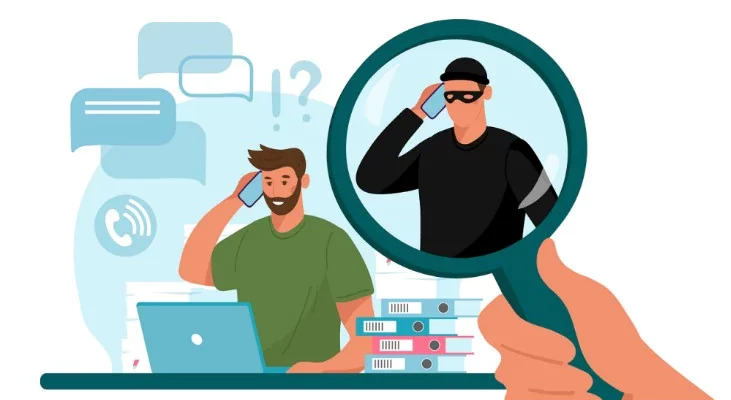Imagine the scene, if you haven't already: you receive a message from a relative saying that they've had a problem and need an urgent bank transfer, just until they regain access to their account. What would you do? This is a well-known type of scam and, when it first appeared, it claimed even more victims.
More and more, we want to solve everything in the palm of our hand. The fewer clicks, the better. This makes life easier and makes us vulnerable to fraud. They appear all the time and in different forms. We have to recognize that innovation and creativity are advancing at both ends: good and bad. And the lack of financial and digital education makes it even easier for fraudsters to operate.
Companies in the credit bureau sector empower users with their credit assessment, anti-fraud, credit recovery, business prospecting and customer portfolio monitoring solutions, among others.
Industry data from a survey carried out in several countries showed that in Brazil, suspected fraud involving financial services grew the most between 2019 and 2021, with an increase of 419.9%. In the world as a whole, the growth was 60.5%. The accelerated advance of this type of fraud is related to the growing digitalization of finance.
In Brazil, the fraud most feared by consumers is credit card fraud: 76% reported this concern. This is followed by identity theft. Concern about card security was mentioned prominently by consumers in several other countries, such as the USA, Canada, Mexico and Chile.

One Crowe company estimateThe report, published in 2019 in partnership with the University of Portsmouth, indicates that the annual losses of individuals and companies amount to US$ 5 trillion. The figure is so large that it needs to be compared with something: it represents something like 6% of global GDP.

In the Brazilian case, studies of the credit bureaus showed that, in 2021, 46% of internet users reported having suffered some kind of financial scam in the last 12 months, a figure that corresponds to around 12.1 million people. Among the most frequent problems, scammed consumers reported not receiving products bought online or receiving something different from what they had bought, as well as contracting services in their name and without authorization. The study estimated a loss of R$ 1.8 billion for these consumers.
Javelin presents a study of the types of criminal scams by generation:

Technological advances are here to stay and we have to deal with fraud in this new space. In fact, there are several ways to mitigate the risks of fraud. When using messaging apps, for example, a simple step that is within everyone's reach is to activate two-step verification, making it difficult to access your contacts from other devices.
The sharing of sensitive data via phone calls is also something that should raise alarm bells. Financial institutions and companies have stepped up campaigns pointing out this danger, informing their customers that official approaches are different. Checking the authenticity of websites and apps before registering is another important measure.
Companies are also subject to scams. Corporate emails can be the gateway to malicious links for stealing information, as well as misuse of the CNPJ. Studies carried out by credit bureaus show that 70% of global companies report that their concern about fraud has increased, and in Brazil this percentage has reached 81%. Fraud affects companies in another way, using the trust that consumers place in them. Companies therefore need controls to protect themselves and their customers.
As fraud becomes more complex, the market can count on credit bureaus as allies in risk mitigation. Among the solutions they offer is the monitoring of inquiries to CPF e CNPJThe combination of several solutions brings sustainability to the lender's business, maintaining relationships and protecting current and future customers.
Some victims only become aware of the fraud when they try to take out credit, but with all the arsenal offered by the bureaus, it is possible to identify the fraudsters' actions much earlier.
On the government side, the Central Bank offers Registrato. This platform provides free information on Brazilians' financial lives, such as data on active loans in their name, banks and brokers with which they have an account, their Pix keys, banking relationship history, and more. It is an important consultation tool for anyone who wants to keep an eye on the misuse of their name.
On the banks' side, FEBRABAN has organized actions such as the recent Digital Security Week. The initiative, with the participation of 26 members, raises awareness about the importance of using digital channels safely to prevent scams and fraud. Fake call centers, phishing, WhatsAppThe discussions focused on bills and the theft of data stored on cell phones.

The fraud exist and challenge us every day. Technological advances have given rise to variations that are updated at lightning speed. How can we deal with this? By disseminating information and facilitating mechanisms that minimize fraudulent action. On the consumerThis involves not only being informed about the subject, but also exploring tools and actually monitoring your information. The benefits of financial innovation, in terms of inclusion, efficiency and well-being, are already beginning to be seen. It can be said that this is a path of no return. And the more educated and prepared we are to deal with this new world of innovation, the harder it will be to take advantage of financial scams.
Thanks for reading! Access other content at ANBC website.
President of ANBC - National Association of Credit Bureaus. Representative of Latin America in the World Bank Credit Committee. He also represents Brazil and Latin America in credit organisations accross the world, such as ACCIS, BIIA and ALACRED.




